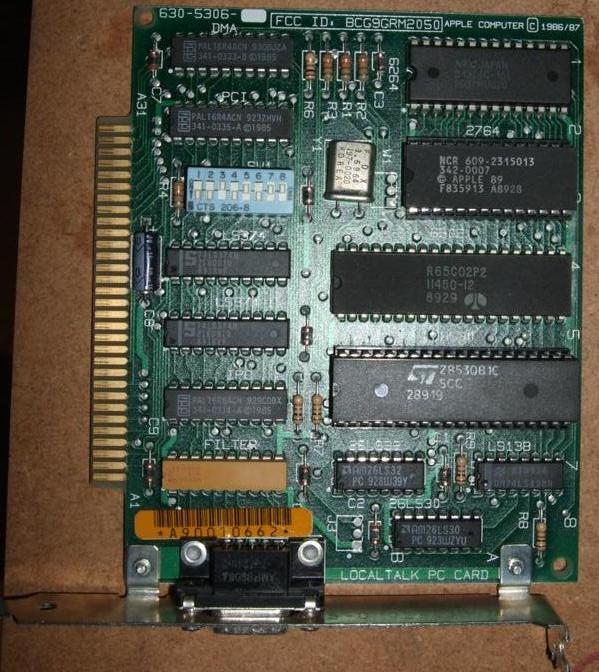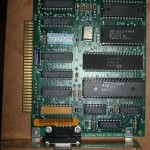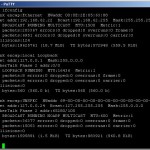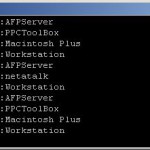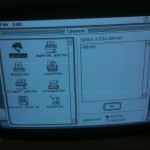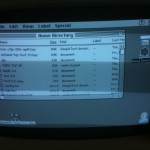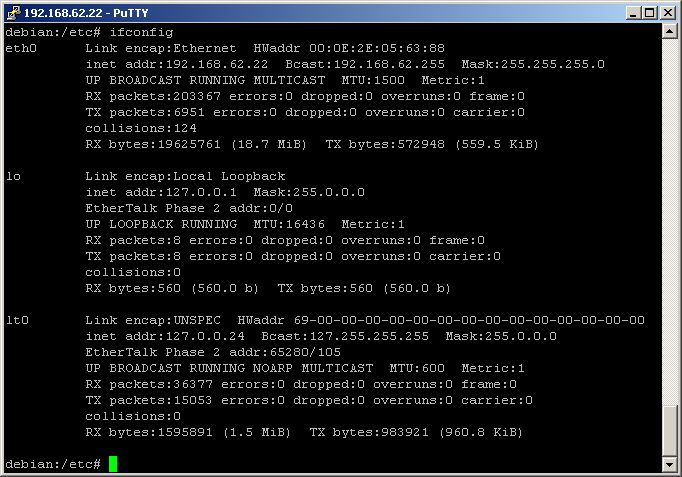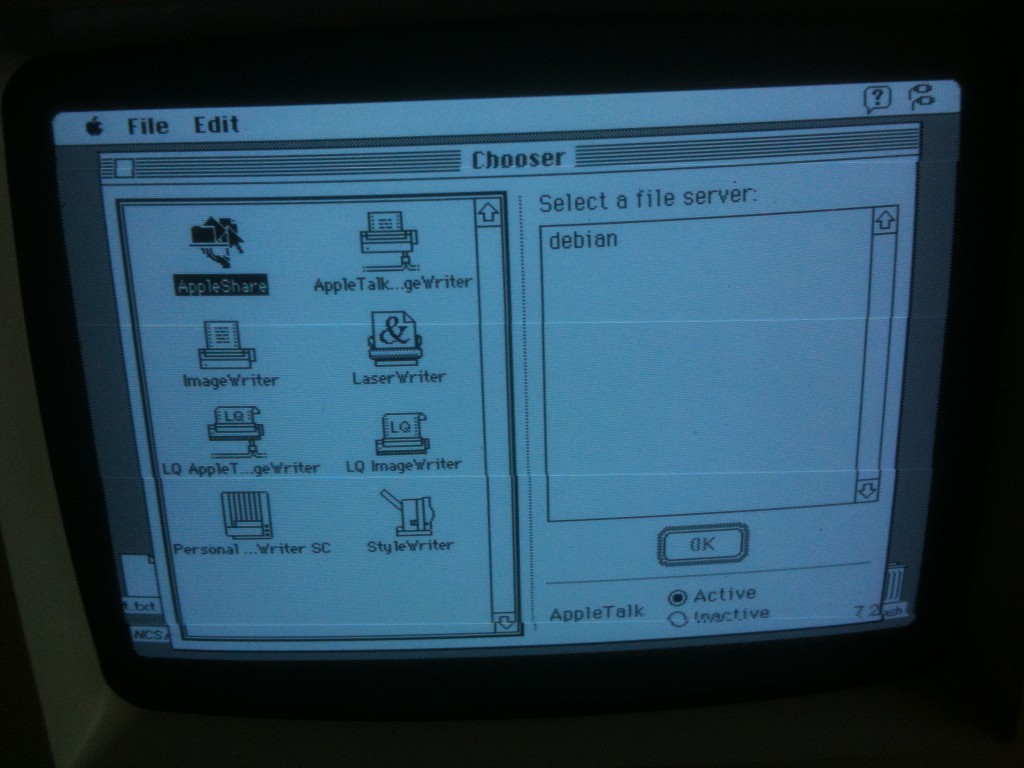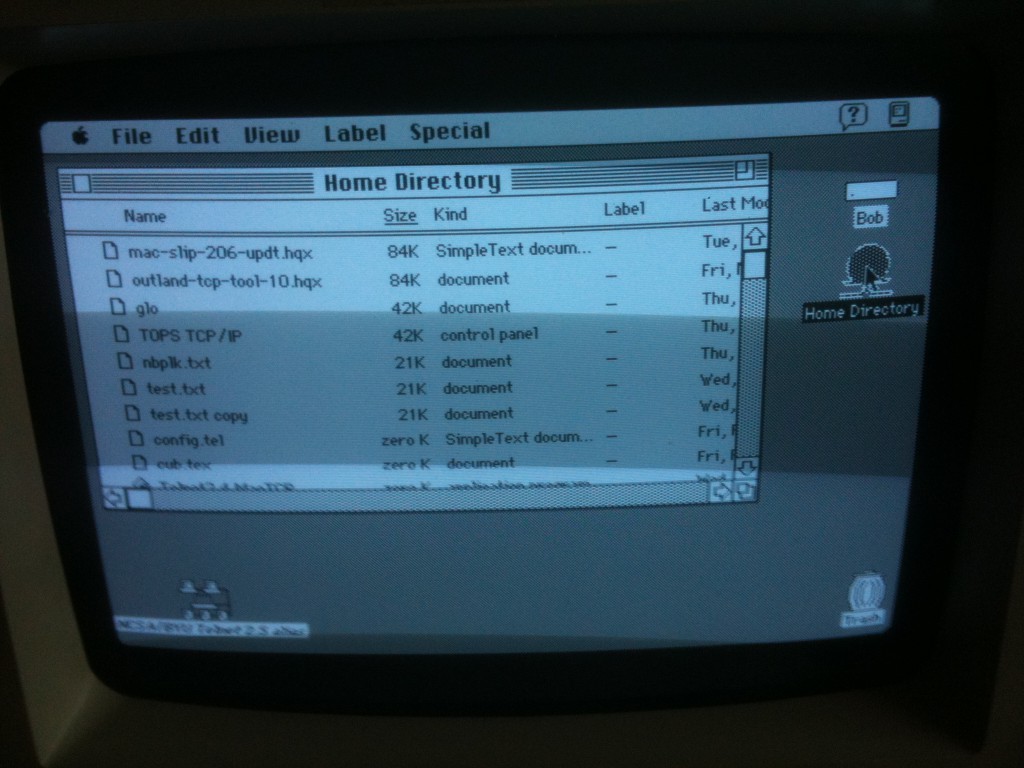A LocalTalk PC card, a Macintosh Plus and a Linux box.
One of the most intriging Mac related pieces of hardware for me are the LocalTalk PC cards. They where used to connect a LocalTalk network to a DOS or Windows 3.11 network. Apple made the first one in 1986/87. I acquired a model 630-5306 Vintagemacword.com has information about this card:
Apple’s official LocalTalk PC card: Half-size ISA card, contains a 6502 processor and Zilog 8530 controller. Set of eight dip swiches for setting IRQ and IO address. LocalTalk (RS-422 serial) interface is a 9 pin D socket, using the same LocalTalk/PhoneNet box as the Mac 128/512. Card is silk screened as “AppleTalk PC Card”, copyright date 1986. Model number 630-0113. The card labelled 630-5306 appears to be identical.
http://www.vintagemacworld.com/pc_hardware.html
An other source of excelent information is:
http://www.the4cs.com/~corin/localtalk/
My first mission was to get it running in a DOS and Windows 3.11 enviroment. This was relative easy. But it required some special equipment. First of all you need an old PC, because of the ISA slot. ISA is not in computers which are build after the year 2000. Futhermore you need a set of DOS and Windows floppy’s to install the operating system. ISA card require fideling around with dipswitches and correct settings in the BIOS. In my case I had to put the card on IRQ 9 and let the BIOS know that IRQ 9 is handeled by the ISA slot. Installation was straigt forward and I could start the Chooser with the DOS command da. Here are some pictures:
When I was Google-ing around I found out that these card where also officialy supported by the Linux kernel. This was very good news for me because I have a Linux box which is central in my AppleTalk network. It runs Netatalk and is one of the central file servers. It would be great to connect to this machine by LocalTalk too!
To be honnest. This is not a job for the fainth at hearth….
I’m very comfortable in a Linux environment but I really had to work hard to get it running.
First of all. AppleTalk and the LocalTalk PC card are not part of a standard Linux instalation. To get it running you have to recompile the kernel to make it a loadable module. I tried it first with my modern Red Hat Linux distribution with a 2.6 kernel. After I got it finaly working (Red Hat has a special way of making a new kernel…) the Netatalk service would couse a kernel panic when it had to use the LocalTalk device. I tried it with many configuration changes in the atalkd.conf..but it didn’t work.
Then I decided to take a Linux distribution which fitted more to the historical situation. I read that ISA support was standard in the 2.4 kernel and not anymore in the 2.6 kernel. So I switched to Debian Woody with a 2.4.19 kernel update. This update was straigt forward. I used the config-2.2.20-idepci file in the /boot directory to create a .config file. With the use of the command make menuconfig I added AppleTalk and the LocalTalk PC card. After that I did the following commands:
make make install make modules make modules_install
and…reboot
The card is only seen by Linux if you have booted first in DOS and have seen dat the card is working. Then reboot in Linux and a the system will actualy see the card.
You can use the card if you edit /etc/modules and add ltpc.
# /etc/modules: kernel modules to load at boot time. # # This file should contain the names of kernel modules that are # to be loaded at boot time, one per line. Comments begin with # a "#", and everything on the line after them are ignored.
af_packet 8139too dummy ltpc
and also in /etc/modutils/arch/i386
alias ltpc lt0
Then I installed Netatalk:
Package: netatalk Version: 1.4b2+asun2.1.3-6 Section: net Priority: optional Architecture: i386 Depends: netbase, libpam-modules, libc6 (>= 2.1), libpam0g, libwrap0 Conflicts: netatalk-asun, libatalk14g, libatalk1 Replaces: netatalk-asun, libatalk14, libatalk1 Installed-Size: 604 Maintainer: David Huggins-Daines <dhd@debian.org> Description: Appletalk user binaries Netatalk is an implementation of the AppleTalk Protocol Suite for BSD-derived systems. The current release contains support for EtherTalk Phase I and II, DDP, RTMP, NBP, ZIP, AEP, ATP, PAP, ASP, and AFP.
The biggest fight to get it working was the configuration of atalkd. I got it finaly working when I just entered lt0 in the /etc/netatalk/atalkd.conf. Netatalk will fill in the correct addresses itself. Mine (/etc/netatalk/atalkd.conf ) looks now like this.
lt0 -phase 2 -net 0-65534 -addr 65280.105
If you do a ifconfig you see the lt0 as a network device:
If you do a nbplkup you see this:
I now can download stuff to the macintosh Plus without any problem.
Here are two pictures how it loks on my Mac.
This operation costs me about two month of blood, sweet and tears…. But I had also a lot of fun!
Next challenge is to get more of these cards and see if I get them up and running in a moderne Linx enviroment!
DOS Software 3005006-EB7D:
http://macintosh.vanegten.com/pccard01.dd
http://macintosh.vanegten.com/pccard02.dd
Discussion in m68kla:
Hietrbij mijn aantekeningen uit /etc/netatalk/atalkd.conf
###############
##let op hij doet het door eerst te booten met MSDOS
## daarna direct door naar Debian. Dan HD71 aan en netatalk starten. Hij vult dan eth0 in. Daarna die uitcomm. en vervangen door alleen lt0 Dan netatalk weer starten en go!
lt0
debian:/home/tjabring# vi /etc/netatalk/atalkd.conf
debian:/home/tjabring# /etc/init.d/netatalk stop
Stopping AppleTalk Daemons: afpd atalkd.
debian:/home/tjabring# /etc/init.d/netatalk start
Starting AppleTalk Daemons (this will take a while): atalkd afpd.
debian:/home/tjabring# nbplkup
debian:netatalk 65280.29:4
debian:Workstation 65280.29:4
debian:AFPServer 65280.29:128
debian:/home/tjabring# nbplkup
debian:AFPServer 65280.29:128
debian:netatalk 65280.29:4
debian:Workstation 65280.29:4
plus:Macintosh Plus 0.92:250
No responses yet
